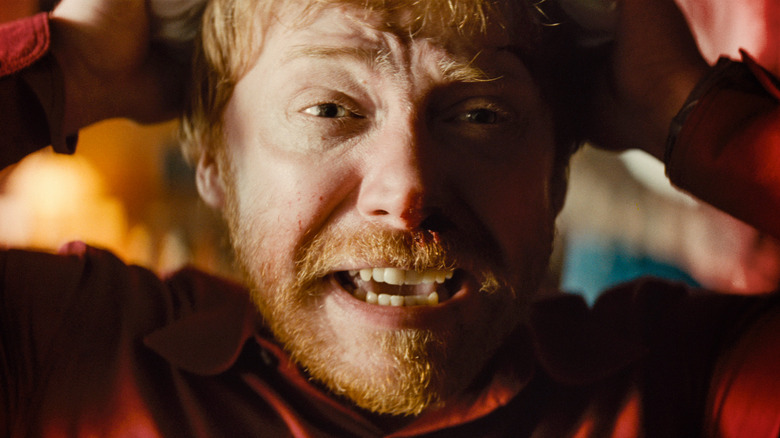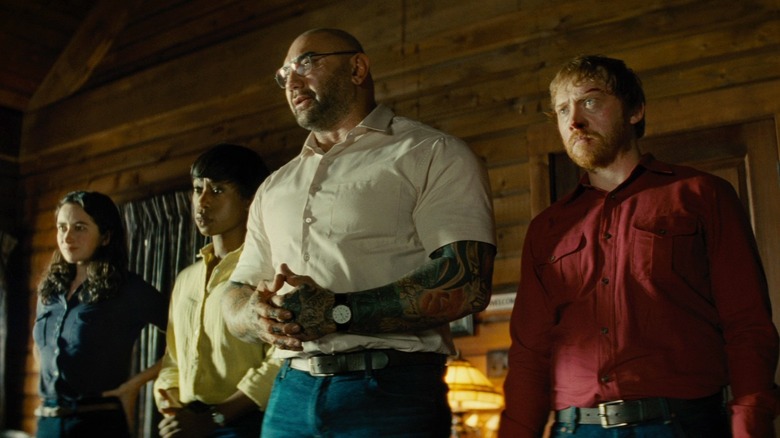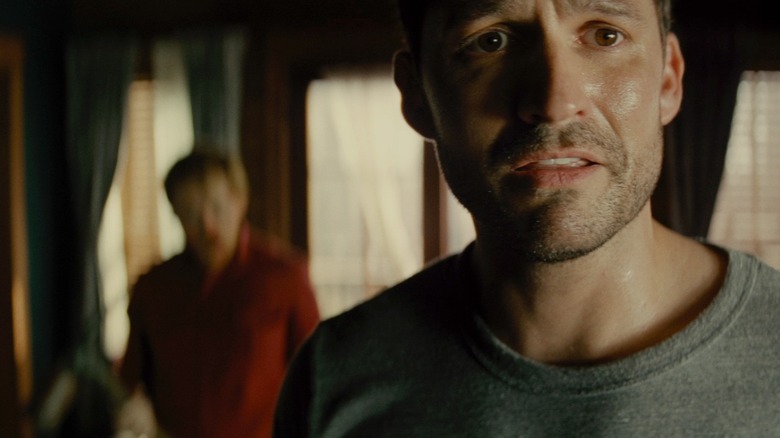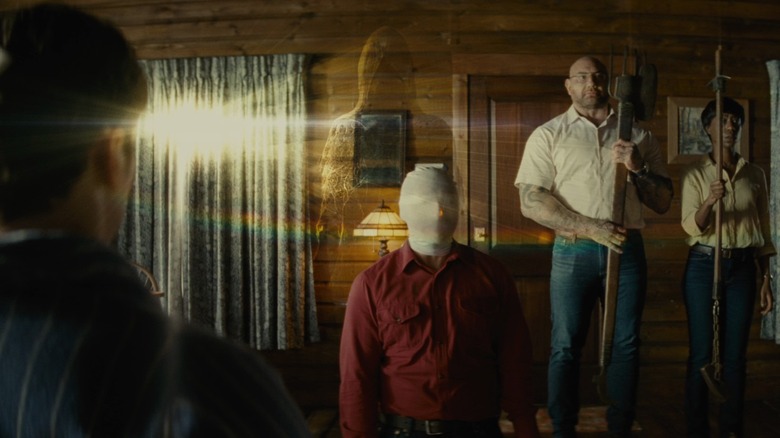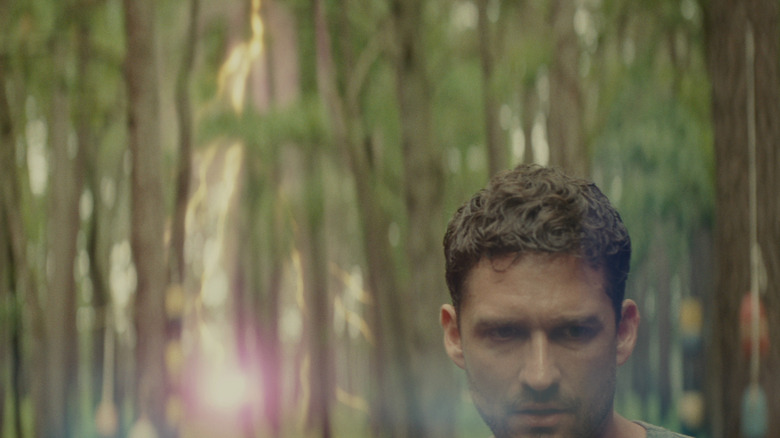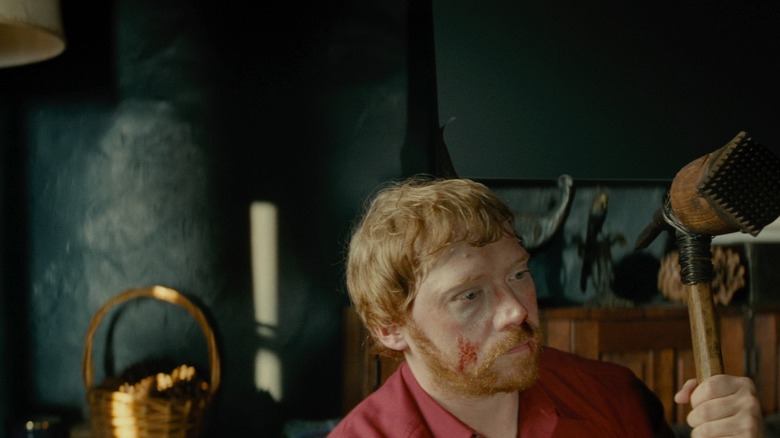Why Rupert Grint's Redmond Is The Most Important Character In Knock At The Cabin
This post contains major spoilers for "Knock at the Cabin."
After adapting Pierre Oscar Lévy and Frederik Peeters' graphic novel "Sandcastle" into his rapid-aging horror movie "Old," filmmaker M. Night Shyamalan has returned to adapt another devastating tale, while putting his own twist on the ending. "Knock at the Cabin," based on Paul G. Tremblay's novel "Cabin at the End of the World," stars Jonathan Groff and Ben Aldridge as Daddy Eric and Daddy Andrew, respectively — a gay couple who adopted their daughter, Wen (Kristen Cui), from a Chinese orphanage when she was a baby.
Now a tightly-knit family unit, they go on the ultimate getaway vacation to a cabin by a lake, two miles from the nearest neighbor and even farther from reliable cell service. But Eric, Andrew, and Wen's bubble of happiness gets popped when four strangers, armed with sinister homemade weapons, break into their cabin and demand that they make a choice: one member of the family must die, and the others must carry out the killing, in order to prevent the apocalypse.
Like the novel it's based on, "Knock at the Cabin" teases out the question of whether the characters' choices really do have apocalyptic consequences. Even as a tsunami crashes onto the west coast of the United States, a pandemic rages, and planes fall out of the sky, it's unclear whether there's any connection between these events and those taking place in the cabin. And one factor, more than any, casts doubt in the minds of the protagonists, the audience, and even the home invaders themselves.
Rupert Grint's character, who calls himself Redmond, isn't a total stranger.
The odd man out
From the very start of "Knock at the Cabin," and in the original novel as well, it's clear that one of these home invaders is not like the other. Leonard (Dave Bautista) is calm and gentle, while Adriane (Abby Quinn) and Sabrina (Nikki Amuka-Bird) are both apologetic about their actions, demonstrating genuine concern for the family they've taken prisoner. After Eric's attempts to fight back leave him with a bad concussion, Sabrina reveals that she's a nurse and anxiously tends to his injury.
Redmond, however, seems entirely remorseless and is outright antagonistic, mocking Andrew when he tells a half-lie about having a gun, and scorning the others' efforts to politely introduce themselves and explain who they are. It is clear that the others do not like him; he is out of sync with their careful, considered approach, and they often have to rein him in.
Until, that is, Redmond dies — quite early in the movie, in fact. He is the first of the "four horsemen" to die, pulling a white bag over his head and declaring, "A part of humanity has been judged," before the others brutally cave his skull in with their DIY weapons. Redmond is seemingly out of the picture until Andrew suddenly realizes that he knows him — that "Redmond" is actually Rory O'Bannon, the violent homophobe who broke a bottle over his head in a bar years earlier. The attack left Andrew traumatized and hard-edged, driving him to take self-defense classes and even buy a gun. That O'Bannon just so happens to be one of the four people who took Andrew and his family hostage and commanded them to make such a horrible choice casts doubt on the whole "apocalypse" thing. Doesn't it?
Faith vs. doubt
Though they might be heartbroken by what they have to do, Leonard, Adriane, and Sabrina are nonetheless resolute in their belief that the apocalypse is coming. Each of them has been plagued by identical, horrifying visions of humanity being wiped out, and are haunted by the screams of their loved ones. However, they discovered one another on an internet message board and had never actually met before the day they came to the cabin. So when Andrew declares that "Redmond" is the same man who attacked him years ago, we see the group's conviction shake for the first time. Their shared apocalyptic visions seem certain, but could the supposed means of preventing the apocalypse have been the work of an interloper? Panicking, Adriane and Sabrina try to remember if they actually knew about the cabin before Redmond mentioned it.
Equally, though, the audience is left uncertain about whether Andrew has correctly identified Redmond as his attacker, or whether he has made a mistake in his terror and exhaustion. Leonard refuses to retrieve Redmond's wallet and ID so that they can find out for sure. It isn't until near the end of the movie — when Adriane and Sabrina have both been killed and people are dying en masse around the world in the apocalyptic plagues — that Andrew finally gets the wallet and confirms that Redmond is, indeed, Rory O'Bannon.
Despite this seemingly damning evidence, though, Leonard's faith remains unshaken. Eric, too, has been convinced that they really do have the power to doom or save humanity. And though "Knock at the Cabin" doesn't make this explicit, there's a reason why Rory O'Bannon — of all the people on the planet — was sent to ask Eric and Andrew to make a choice.
The four horsemen
Shortly before Redmond is sacrificed to unleash the first plague, Eric — suffering from a sensitivity to light after his concussion — glimpses a hooded figure hovering behind him. He eventually concludes that the four strangers are in fact the four horsemen of the apocalypse, each representing a different aspect of humanity. Leonard, a teacher and coach, represents guidance. Sabrina, a nurse, represents healing. Adriane, a line cook and mother of a young boy, represents nurturing. And Redmond represents malice.
Once again, it's immediately obvious that there's an odd man out here: three of the "horsemen" represent generally positive traits, and one represents a wholly negative trait. This ratio isn't just Shyamalan's own optimistic view of humanity; it also reflects research done by the University of California, which indicated that humans are naturally inclined towards resource-sharing and acts of altruism. The research cites Charles Darwin's "sympathy hypothesis" of human evolution, in which Darwin critiqued the "survival of the fittest" model and offered an alternative that might explain acts of selflessness:
"In however complex a manner this feeling may have originated, as it is one of high importance to all those animals which aid and defend one another, it will have been increased through natural selection; for those communities, which included the greatest number of the most sympathetic members, would flourish best, and rear the greatest number of offspring."
Darwin's theory is borne out by modern research. One study of CCTV footage from 219 violent public altercations found that, in 90% of cases, bystanders intervened to help the victim or de-escalate the conflict. And a 2016 meta-analysis of studies on the link between kindness and happiness found that people do get a modest boost in happiness when they carry out acts of kindness.
But if that's true ... why does the world seem so terrible?
All of humanity has been judged
Each time that Eric, Andrew, and Wen are asked to choose a family member to sacrifice, and they refuse to make the choice, one of the four horsemen is killed and a plague is unleashed. Before they die, they say the same phrase: "A part of humanity has been judged." The apocalyptic events seem to be escalating in their death tolls: first, tsunamis that hit only evacuated Hawaiian resorts and a section of the U.S. west coast; then a plague that targets children in three cities; then, hundreds of planes falling out of the sky all over the world. When the time comes for Leonard's death — the final death — he changes things up, saying, "All of humanity has been judged."
The phrasing is crucial because of Andrew's reasons for refusing to make a choice. Throughout the film we see flashbacks of his life with Eric: being violently attacked simply for telling his partner that he loves him; pretending that Eric is one half of a heterosexual couple, and that Andrew is only his brother-in-law, so they can adopt Wen; Andrew's parents driving for hours to visit and, after he comes out to them, staying for only 45 minutes. In this scene, we hear the phone ringing — Eric's supportive mother, calling to ask how it went — but it's background noise to Andrew, who is fixated on his own parents' intolerance.
This is why Redmond is the most influential of the four horsemen, despite being outnumbered and despite being the first to die (in keeping with Darwin's hypothesis). Whether because Andrew has been disproportionately targeted by malice, or simply because the malice looms larger in his view than any guidance, nurturing, or healing, he judges all of humanity based on his worst experiences. And he's outright insulted by the suggestion that he should sacrifice one of the two people he loves most to save the outside world that despises them.
Ending the cycle
Although Redmond is initially reluctant to tell the family his own life story, pressure from his fellow horsemen prompts him to offer up details. Having badly lost a brawl with Andrew, he shares that his father used to beat him when he was a child, just like Andrew did, and that he wishes he could introduce his father to the weapon he now wields. He also says that he's single; unlike the others, he seems to have no one in his life that he cares about, or who cares about him. And he says that he has done some time in prison — as we later find out, for his attack on Andrew — but he's not the person he once was; he wants to be better.
It's unclear whether Redmond recognizes Andrew or is aware of their personal connection. But what is clear is that, like the three others, he came to the cabin to try and prevent the end of the world, despite knowing that he would be the first in line to die at the first refusal — which, given the circumstances, was virtually inevitable. Little wonder that he seemed more pessimistic and nihilistic, declaring that introducing himself wasn't important and would make no difference.
But, as Eric tells Andrew before offering himself up as the family's sacrifice, there was a reason why the four horsemen were regular people instead of inhuman spectres; it was so that he, Andrew, and Wen would truly feel the weight of their deaths, and the deaths of everyone else in the world. They're presented with four faces of humanity, and in the end — despite everything they've been through, even despite Andrew being brought face-to-face with the man who left him both physically and psychologically scarred — they judge humanity to be worth a second chance.
"Knock at the Cabin" is in theaters now.
